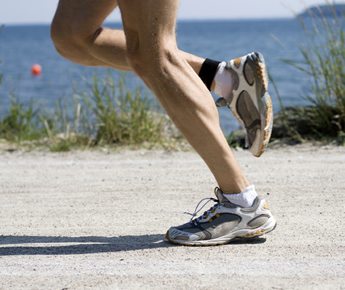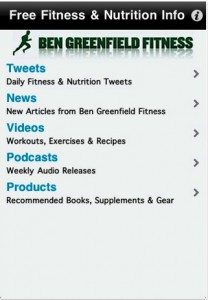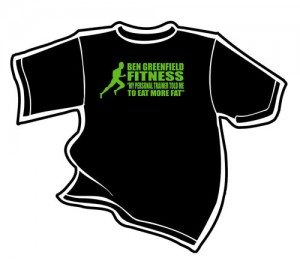March 23, 2011
Click here for the full written transcript of this podcast episode.
Do you have a future podcast question for Ben? Scroll down on this post to access the free “Ask Ben” form…
In this March 23, 2011 free audio episode: The Central Governor with Dr. Tim Noakes, is non-alcoholic beer healthy, receding gum lines, serum vs. free testosterone, isometric ab exercises, how to raise natural hormone levels in women, and indoor cycling workouts.
Remember, if you have any trouble listening, downloading, or transferring to your mp3 player just e-mail [email protected]. And don't forget to leave the podcast a ranking in iTunes – it only takes 2 minutes of your time and helps grow our healthy community! Just click here to go to our iTunes page and leave feedback.
Scroll down to donate anything over $15 to the show, and Ben will send you a BenGreenfieldFitness.com t-shirt…you can also conveniently donate any amount with your phone by simply clicking here.
Featured Topic: “Tim Noakes Tells You How You Can Use The “Central Governor” To Tap Into Your Muscle's Hidden Potential.”
In this interview with Dr. Tim Noakes, who has written multiple books on physiology, including “Lore of Running”, which you can view more about by clicking here, Ben talks to Noakes about the central governor theory and asks:
Can you describe the central governor model?
What are examples of this model in sports today?
In consideration of this model, how can athletes advantageously modify their training and racing protocols?
What type of research are you doing now on this subject?
This is a can't miss interview for anyone who wants to learn how to exercise harder, longer and faster using the principles of the central governor theory.
—————————————————–
Special Announcements
-BenGreenfieldFitness Inner Circle is now just $1 for a 14 Day Sneak Peek! Click here to join now.
-Tuesday, April 12 at 6pm PST: Join Ben Greenfield from BenGreenfieldFitness.com and Dr. Rick Cohen from Bioletics to learn everything you *didn't* know about Vitamin D and Fish Oil, in the interactive seminar “The Shocking Truth About Vitamin D & Fish Oil”. Click here to RSVP at Vokle and make sure your camera and mic are ready if you want to use them for questions.
-The new BenGreenfieldFitness Android phone app is here and it's free. Click here to grab it now! (or click here for the iPhone version).
-You can now shop at the BenGreenfieldFitness Facebook page! Click here to visit now. If you post a comment and link about this on your page, then let me know by leaving a comment on the BenGreenfieldFitness Facebook page, I will send you a $20 coupon for anything there!
-Interested in advertising on the BenGreenfieldFitness podcast or blog? Click here to download the advertising information and pricing sheet.
-Here's what you get in the new BenGreenfieldFitness iPhone app, which you can get for free by clicking here:
-Weekly audio podcast featuring exercise and nutrition Q&A with Ben and a featured interview with a health or fitness expert.
-Articles unlike any you’ll read on other sites, featuring the real truth about your health, your body, diet, medicine and more.
-Workout and recipe videos – designed for the complete beginner up to the advanced athlete.
-Nutrition supplements, popular diets, workout programs, book and video reviews from Ben Greenfield.
-24/7 access to ask your questions to Ben, suggest custom content for the articles and videos, or request guest experts.
– Get insider VIP tips and discounts from Ben – conveniently delivered directly to your phone! Just complete the information below…
| First Name | |
| Last Name | |
| Cell # (1+area code) | |
Listener Q&A:
====================================== [contact-form 3 “AskBen”] ======================================
Jeff has a call-in question about non alcoholic beer.
Cara asks: I read the book Digestive Wellness and the author states that receding gum lines in the mouth are due to bone loss. I eat paleo (no dairy) but I do eat plenty of vegetables and strength train. Is that enough to prevent bone loss? My gums are receding and seem to be getting worse. I had been taking AdvaCal Ultra 1000 as a supplement. Should I not supplement with any calcium or do something different?
Gerry asks: I know you've talked about serum testosterone in the blood. Is there a direct relationship between serum levels and free testosterone levels? If so, how strong in the correlation? My serum testosterone levels are at 84
Julie asks: Hey Ben. I had some back surgery on L4/L5 and L5/S1 a few months ago. My doctor cleared me to start exercising but recommended avoiding all exercises that involve a crunching or pike motion. Can you outline effective and safe abdominal and lower back exercises that are isometric in nature? Right now all I can think of is the plank. Are upright rotational movements okay for spinal injuries (such as the woodchopper exercises)?
Liz has a call in question: I am a 33 year old active female. I run an average of 40 miles per week, and I just qualified for Boston with no small thanks due to your Marathon Dominator package (awesome, by the way!). I am pretty lean, at about 5'6″ and 117lbs. I also lift weights 5 days per week. I stopped getting my period about a year and a half ago, and although irregular menstration runs in my family, and it did coincide with a significant rise in my general fitness level, my doctor recently prescribed a ten day dose of Progesterone to induce a period. I was wondering if you could offer any nutritional guidelines for helping to raise my hormone levels naturally.
In my response to Liz, I recommend EnerEssence I.
Kris asks: Personally Indoor bike session are painful I would much rather be outside. My question to you is how long is a fair amount of time to spend on the bike trainer, and what kind of drills, intervals etc can I do on the trainer?
——————————————–
Remember, if you have any trouble listening, downloading, or transferring to your mp3 player just e-mail [email protected] And don't forget to leave the podcast a ranking in iTunes – it only takes 2 minutes of your time and helps grow our healthy community! Just click here to go to our iTunes page and leave feedback.
Brand new – get insider VIP tips and discounts from Ben – conveniently delivered directly to your phone! Just complete the information below…
| First Name | |
| Last Name | |
| Cell # (1+area code): | |
Scroll down to donate anything over $15 to the show, and Ben will send you a BenGreenfieldFitness.com t-shirt…you can also conveniently donate any amount with your phone by simply clicking here.
——————————————————





That test is a one time thing. Once you have your LT number, you might do, for example, 10×2 minute intervals at 110-115% of that number.
Ben, I don't think that you are getting the central governor theory. You seem to keep thinking that since the brain is now known to be the central governor, rather than the muscles determining "quit" time, that this means using "mind tricks" will work. That's not the case at all, it has nothing to do with the mind and everything to do with learning the best ways to train knowing that the brain is the limit, not our muscles.
Hi there, thanks for such a great interview. Found your website through Jimmy Moore's site. I have a question regarding intensity vs quantity of training. I assume that your heart rate is a good marker for the intensity of your workout – in my case, on a treadmill, and my daughter's case as a competitive speed swimmer. Pushing your body to the point of your brain saying "stop" always seems to correlate to a very high heart rate. Is this indeed a good marker for your intensity of training? I love the saying "training to race, not training to train". As a side note to intense activity making you hungry, I personally find intensive interval training for just 20 minutes, always stifles my appetite for several hours. (I do not find I over compensate, just the opposite.)
A better marker for gauging training intensity is measuring your "lactate threshold" heart rate. Check out this article: http://pacificfit.net/tri_articles/triathletearti…
Ben, I have to respectfully disagree with you on the secrets of losing weight. I have lost 40+ pounds in about 6 month period twice in my life. Once in my mid 20s .. then slowly put it back on and now about age 50. Both times I counted calories and made sure my protein intake was reasonable (ie. the calorie restriction came mostly from carbs, although I was not low carbing either time) and I walked 2+ miles a day. I found the walking was of several benefits: 1) It relaxed me (now we know excess cortisol can retard weight loss); 2) Yes it takes more time, time people like me get bored and end up snacking and watching TV; 3) It did not stoke my appetite like running, weight lifting or bicycling does; 4) It teaches the body how to burn fat and thus mobilize fat reserves, thus one does not become as hungry during the day or in the morning because the body hasn't simply burned through all the carbs in the body but has used more fat instead.
I'm not a scientist so I can't prove any of this. its an N=1 experiment. But I believe the last point especially is very in line with Paleo thinking on the advantages of a low car diet.
I felt your guest discredited himself a bit by saying leg muscle strength was the most important factor in reducing foot contact time and increasing running speed. That comment seems comparable to saying that the key to not getting burned if you touch a hot stove is to have very strong forearm and hand strength so you can push your hand off the stove. Rather we intuitively know you would minimize contact time and burn by PULLING your hand off the ground.
In the same way, I’ve found my running efficiency and speed have improved tremendously by learning ChiRunning body positioning with a slight forward lean and then focusing on pulling my feet off the ground rather than pushing my body forward. Lieberman’s work at the Harvard Barefoot Running lab should back up this comment. http://www.barefootrunning.fas.harvard.edu/
Ben, can you elaborate on the counting method? Counting miles, footsteps, etc. to distract yourself? What do you do?
Great interview with Dr. Noakes, Ben. The Central Governor Theory is fascinating and highlights what little we really know about the limitless power of our brains. Believe you asked him about techniques you could employ in a race to tap into this but don't think he answered it. How does this concept changed to approach to training and racing?
If you can distract your brain from neuronal override, you can go longer. I suggest during training, using music for the hard intervals, and for racing, using a counting method. It's worked for me.
Absolutely fascinating interview with Tim Noakes. Really does support the HIIT model. Great podcast Ben.